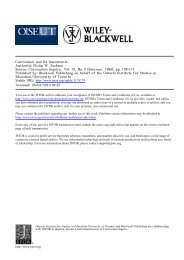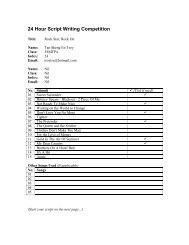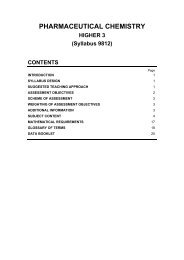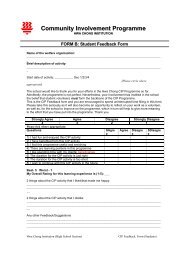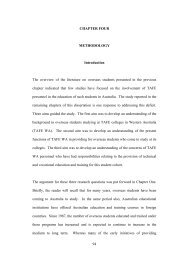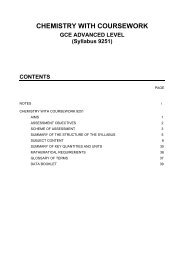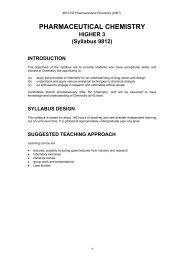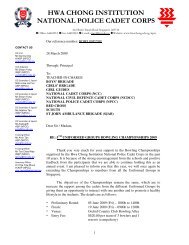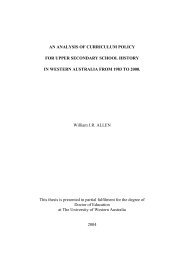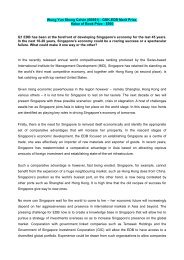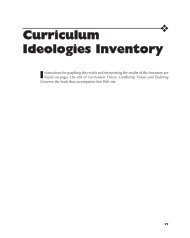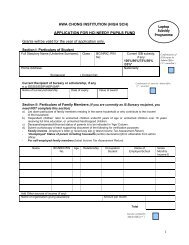Scientific Management and Weber's Bureaucracy
Scientific Management and Weber's Bureaucracy
Scientific Management and Weber's Bureaucracy
You also want an ePaper? Increase the reach of your titles
YUMPU automatically turns print PDFs into web optimized ePapers that Google loves.
Educational Leadership<br />
Leading the Organization:<br />
<strong>Scientific</strong> <strong>Management</strong> <strong>and</strong><br />
Weber’s <strong>Bureaucracy</strong><br />
Elaine Sharplin
Choose the word or words that best describe some aspect of<br />
your organisation :<br />
•An organism, a machine, a layered cake, a social club<br />
•Decisions are made by:<br />
consensus, democratic system, executive positions<br />
or in accordance with rules <strong>and</strong> regulations<br />
•Workers are motivated by:<br />
money, peer influence, negative consequences,<br />
intrinsic motivation<br />
•Students are seen as:<br />
raw materials, inputs/outputs, individuals with<br />
personal needs, members of a class/year/peer group
EFFECTIVENESS<br />
• An action is effective if it<br />
accomplishes its specific aim.<br />
• To be effective an institution or<br />
individual must accomplish<br />
something.<br />
• The term implies deliberate action<br />
aimed at achieving a specific target.
EFFICIENCY<br />
• Efficiency involves accomplishment, but<br />
implies without waste of effort or<br />
resources.<br />
• It has value-for-money connotations.<br />
• The degree of efficiency is the extent to<br />
which resources are consumed in<br />
achieving the goal.
Take the following statements <strong>and</strong><br />
develop several scenarios which<br />
illustrate these points.<br />
a) A school can be effective but<br />
inefficient<br />
b) A school can be efficient but not<br />
effective<br />
c) A school can be effective <strong>and</strong> efficient<br />
but not necessarily excellent (in the sense<br />
of being best amongst its peers).
SCIENTIFIC MANAGEMENT<br />
Taylor developed four principles:<br />
1. <strong>Management</strong> must analyze work practices using time <strong>and</strong> motion<br />
studies<br />
2. Workers should be carefully selected, trained <strong>and</strong> paid to do a<br />
good job<br />
3. Workers <strong>and</strong> managers must cooperate for the new management<br />
principles to succeed<br />
4. Planning must be separated from the completion of the task.<br />
Planning includes the creation of a suitable work environment
Henri Fayol (1841-1925)<br />
Managerial activity consists of five<br />
elements:<br />
– planning,<br />
– organizing,<br />
– comm<strong>and</strong>ing,<br />
– coordinating,<br />
– controlling.
Managers needed to<br />
possess certain qualities<br />
1. Physical qualities - vigour, good health<br />
2. Mental qualities - underst<strong>and</strong>ing, judgement,<br />
adaptability<br />
3. Moral qualities - loyalty, firmness, initiative,<br />
responsibility<br />
4. General education<br />
5. Specialized knowledge - relevant to the field of<br />
business or industry<br />
6. Experience - in the field.
Lyndall Urwick (1891-1984)<br />
Principles for the guidance of<br />
managers<br />
1. Objectives - all organizations should have a clearly specified<br />
purpose;<br />
2. Correspondence - authority must be equalled by responsibility;<br />
3. Ultimate authority - higher authorities have absolute responsibility<br />
for the work of subordinates;<br />
4. Scalar principle - a line of authority exists from the ultimate<br />
authority to the lowest position in the organization;
5. Span of control - supervision should be limited to<br />
the direct control of no more than five or six<br />
subordinates<br />
6. Specialization - an employee's work should be<br />
limited to one function<br />
7. Coordination - all activities must be coordinated<br />
<strong>and</strong><br />
8. Definition - each duty must be clearly described<br />
(Wren, 1987).
LEGACY OF SCIENTIFIC<br />
MANAGEMENT THEORY<br />
Efficiency as the measure of managerial<br />
success (The notion of economic<br />
rationalism continues to be highly<br />
influential.)<br />
• Increased productivity through planning<br />
of tasks,<br />
• The division of labour <strong>and</strong> specialization<br />
• Selection of staff <strong>and</strong> training for<br />
efficiency.
• The use of time <strong>and</strong> motion studies.<br />
• Use of monetary incentives<br />
• The st<strong>and</strong>ardization of tasks<br />
• The principle of unity of comm<strong>and</strong> - that<br />
orders should be received from only one<br />
super-ordinate<br />
• Focus on formal organizational structures.
CRITICISMS OF SCIENTIFIC<br />
MANAGEMENT THEORY<br />
• 1. Man is viewed narrowly as motivated<br />
only by economic considerations<br />
• 2. The models developed are too<br />
simplistic<br />
• 3. The worker is viewed in isolation – as a<br />
machine, not as a social being<br />
• 4. The physiological emphasis is<br />
inadequate without use of sociological<br />
<strong>and</strong> psychological theories.
Weber‘s three types of authority<br />
1. Traditional - precedent, usage, custom<br />
2. Charismatic - rooted in individual<br />
personality<br />
3. Rational-legal - means to achieve<br />
goals, authority rests on rules,<br />
procedures.
<strong>Bureaucracy</strong><br />
• "... a clearly defined hierarchy where<br />
office holders have very specific<br />
functions <strong>and</strong> apply universalistic rules<br />
in a spirit of formalistic impersonality"<br />
(Silverman,1970, p.11).
Weber’s characteristics of an<br />
ideal bureaucracy<br />
1. Specialization of task<br />
2. Rational, hierarchical, authority<br />
structure<br />
3. Formal system of rules/regulations<br />
4. Impersonal/impartial allocation of work<br />
5. Stable career structure based on<br />
promotion according to competence<br />
6. Clear lines of communication.
CRITICISMS OF WEBER'S THEORY OF<br />
BUREAUCRACY<br />
• encourages overconformity<br />
• modifies the personality of bureaucrats<br />
• encourages communications overload<br />
• produces goal displacement<br />
• prohibits adaptation to change<br />
• raises the problem of the needs of the<br />
organization versus the needs of people.
• Are you a scientific manager or a<br />
bureaucrat?<br />
• Is your organisation influenced by<br />
scientific management or bureaucratic<br />
ways of operating?



